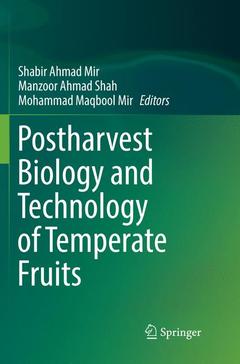Description
Postharvest Biology and Technology of Temperate Fruits, Softcover reprint of the original 1st ed. 2018
Coordinators: Mir Shabir Ahmad, Shah Manzoor Ahmad, Mir Mohammad Maqbool
Language: English
Subjects for Postharvest Biology and Technology of Temperate Fruits:
Publication date: 01-2019
Support: Print on demand
Publication date: 06-2018
Support: Print on demand
Description
/li>Contents
/li>Biography
/li>Comment
/li>
This edited volume provides insight into temperate fruits, with an emphasis on postharvest physiology, storage, packaging and technologies for maintaining fruit quality. Chapters are devoted to individual fruits and focus on fundamental issues such as methods for maintaining or enhancing quality, minimizing postharvest losses, and recommended technologies to boost demand. Contributions come from experts in the field, making this a key reference for all aspects of postharvest management of temperate fruits.
The volume is unique in its focus on the biodiversity, nutritional and health benefits, and postharvest technologies for shelf life enhancement of temperate fruits. Contributing authors address the postharvest biology and technology of individual temperate fruits such as plum, cherry, peach, apricot, apple, pear, quince, loquat, kiwi, persimmon and berries. There has been tremendous growth in the research and development of new techniques to maintain the quality of temperate fruits from farm to table. Contributions from experts in the field cover these recent advances, providing up-to-date and relevant information for researchers, postharvest/fruit technologists, food scientists, postgraduate students, and others working in the industry.
Shabir Ahmad Mir, Ph.D., obtained his Ph.D. in Food Technology from Pondicherry University, Puducherry, India. He has received the Best Whole Grain Ph.D. Thesis Award 2016 (South Asia) for outstanding research work by the Whole Grain Research Foundation. At present, he is a Food Technologist at Islamic University of Science and Technology, Awantipora, India. Dr. Mir has published numerous international papers, book chapters, and conference papers. In addition to close association with many scientific organizations in the area of food technology, he is an active reviewer for the Journals-Food Chemistry, Journal of Cereal Science, Journal of Food Science and Technology, Food Packaging and Shelf life, and many other scientific journals of repute.
Manzoor Ahmad Shah, Ph.D., received M.Sc. (Food Technology) degree from Islamic University of Science & Technology, Awantipora, India and Ph.D. (Food Technology) degree from Pondicherry University, Puducherry, India. The author has been awarded with gold medal for outstanding performance during his M.Sc. degree programme. Dr. Shah has more than 30 publications in internationally reputed journals and 10 book chapters. He is an active reviewer for the journals-LWT-Food Science & Technology, Food Packaging and Shelf life, Food Research International and many other scientific journals of repute. He has attended several national and international conferences, workshops and seminars.
Mohammad Maqbool Mir, Ph.D.,obtained his Ph.D. in Horticulture (Fruit Science) from Sam Higginbottom Institute of Agriculture Technology and Sciences, Allahabad. At present, he is an Assistant Professor at the Division of Fruit Science, Faculty of Horticulture, Sher-e-Kashmir University of Agricultural Sciences and Technology of Kashmir, Shalimar, Srinagar. He is associated with many externally aided projects and also with research group working on canopy architectural management, production te
Uniquely focuses on postharvest handling and technology of temperate fruits
Covers fundamental issues such as the means of maintaining and enhancing quality, minimizing postharvest losses, and recommended storage technology
Targeted towards researchers, food/fruit technologists, postgraduate students, and others working in industry




